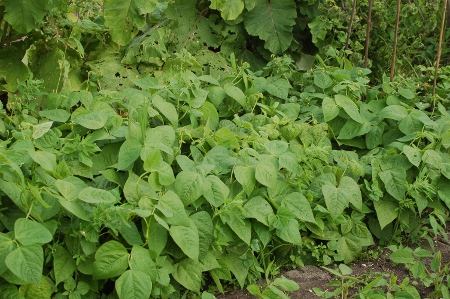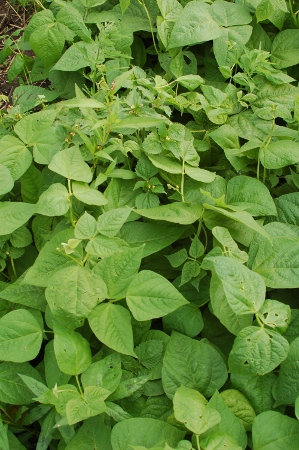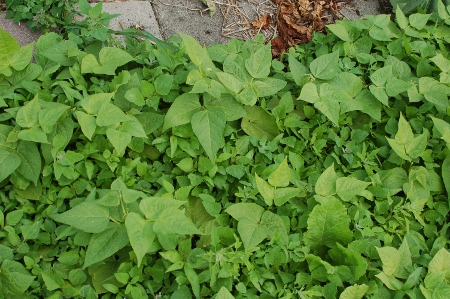Over the last couple of years I’ve discovered a really interesting variety of beans.
They are Yellow Forest Beans, an old variety that used to be grown in Friesland, in the northern part of the Netherlands and probably parts of Germany too. They are what Americans would call bush beans and British would call dwarf French beans.
What’s interesting about these beans is they require little or no weeding, at least in my climate!
Ordinarily, this type of bean will grow to smother any weeds, but usually needs a little hand weeding at the beginning or the weeds will overtake them. This bit of hand weeding at the beginning is most of the work required to grow them!
Below is the bed of beans where I didn’t do any weeding.
You can see a few weeds poking their way through, but it’s not very serious. Here’s a picture taken straight down.
Okay, because I’m a diligent gardener, I’ll probably do a little weeding here later, but it doesn’t need much!
Here’s a similar bed of beans of a different variety. Can you see any weeds here? This is going to be a lot more work.
For the sake of clarity and honesty, I did use a weed burner on both of these beds before planting them, and this does reduce the weeds. Next year I’ll try the Yellow Forest Beans without burning the ground first, and I expect to see more weeds.
I also haven’t had a chance to eat these beans yet, because I’ve been trying to bulk up on seeds. I’ll try them in a few weeks. They may not taste good.
All of these beans above were grown on rich soil, where I’ve grown beans within the last few years and so I know there’s good availability of rhizobia bacteria. These things are important, because I think the ability of this variety to compete against weeds comes all or partly down to the plant’s vigor. It’s possible however there’s more than that, for example a growth inhibiting chemical in the roots, that makes weeds grow slower.
Why It’s Important
You might think I’m a lazy gardener, and perhaps that’s part of it, but I do everything I can to avoid pulling weeds or digging in my garden! The problem is weed seeds, once covered, remain in the ground for decades or even sometimes centuries. When you disturb the ground, you bring these seeds to the surface where they grow. This means every time you pull or dig weeds, you’re just creating a self-perpetuating problem. By using no-dig methods like mulch or weed burning, you reduce this problem.
The problem is even compounded further when you grow something like beans, because they fix nitrogen in the ground, which makes the weeds grow all that much faster! If you don’t manage the weeds, not only will the beans not grow well, but the benefit of nitrogen fixing will be at least partly lost as the weeds consume it.
On the other hand, if you have a nitrogen fixing crop that smothers weeds and is largely carefree, it’s of much more value to grow, even just as a cover crop!
When it comes down to it, the limiting factor for almost all of us is the amount of effort our garden takes to manage. By not weeding, much of the effort needed to maintain a garden is gone and we can manage a larger piece of land with more crops if we want. This is also true commercially, where a variety that needs little or no weeding can make all the difference in profitability.
These days of thinning ozone make me a little worried with every hour I spend in the garden. Growing anything that requires less weeding means fewer hours in the sun.
After all, all of these benefits of reduced weeds are what make RoundUp ready crops so attractive. This on the other hand is a sustainable and organic alternative.
The Genetics
Like I mention above, I haven’t tasted these yet. In many ways, it doesn’t make that much difference if these taste good, but rather I’ve discovered genes that can be used with further breeding.





Very interesting !
Have you been able to evaluate it for taste and productivity ?
Hi Nicolas,
The taste is really excellent, and the plants are also among the most productive I’ve tried in my garden.